The Development of the Unconscious: Theories of Klein and Winnicott
VerifiedAdded on 2019/09/16
|8
|2862
|298
Essay
AI Summary
This essay provides a comprehensive analysis of the theories of Melanie Klein and D.W. Winnicott on the development of the unconscious. It explores key concepts such as unconscious phantasy, the paranoid-schizoid and depressive positions, projective identification, and transitional objects. The essay examines how these theories contribute to understanding child development and the impact of early relationships on mental models and interpersonal dynamics. It also discusses Winnicott's stages of dependency and the concept of holding, along with Klein's views on part and whole object relations, and the significance of envy and gratitude in psychological development. The essay highlights the contributions of both psychoanalysts and their impact on the field of psychology.
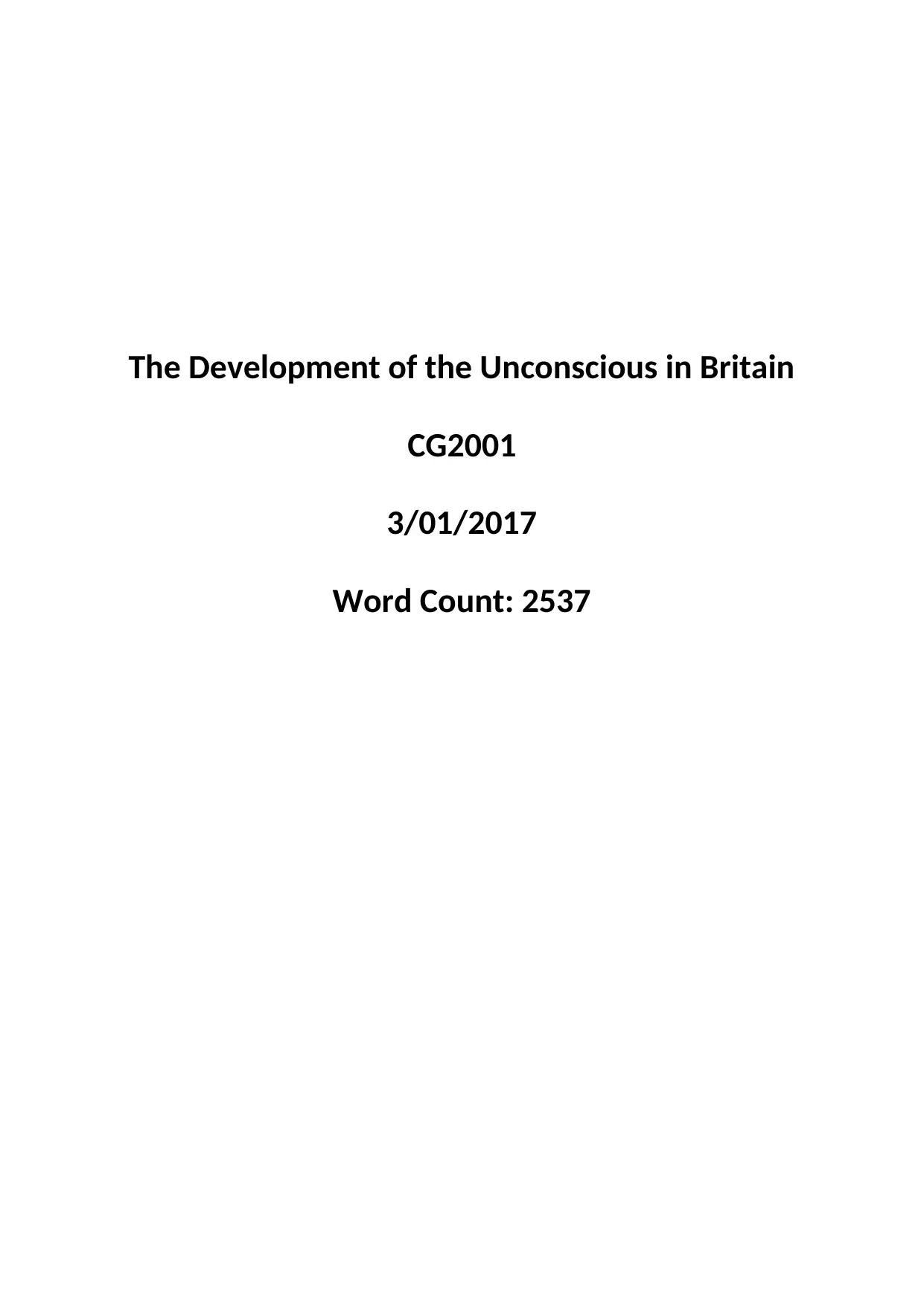
The Development of the Unconscious in Britain
CG2001
3/01/2017
Word Count: 2537
CG2001
3/01/2017
Word Count: 2537
Paraphrase This Document
Need a fresh take? Get an instant paraphrase of this document with our AI Paraphraser
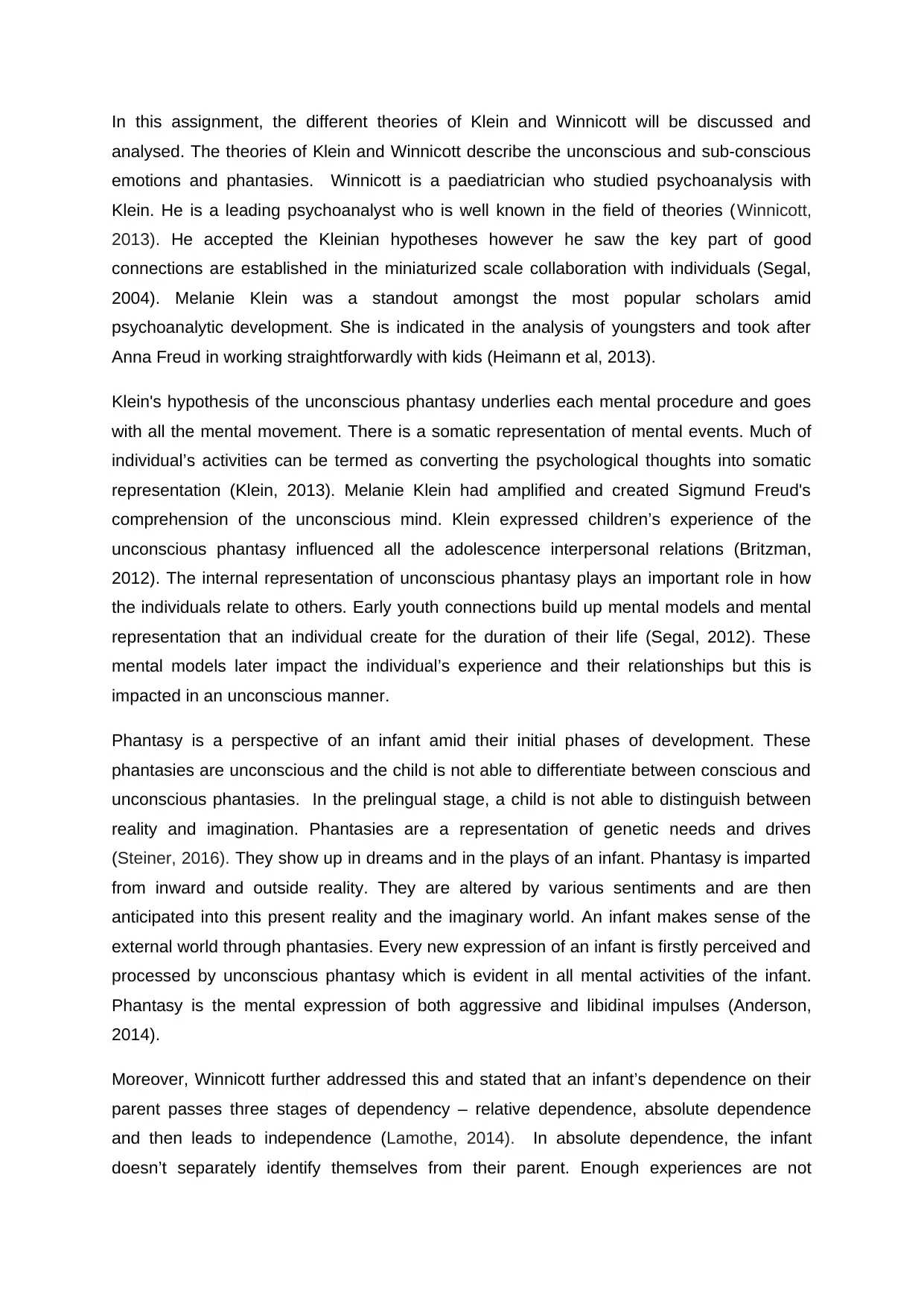
In this assignment, the different theories of Klein and Winnicott will be discussed and
analysed. The theories of Klein and Winnicott describe the unconscious and sub-conscious
emotions and phantasies. Winnicott is a paediatrician who studied psychoanalysis with
Klein. He is a leading psychoanalyst who is well known in the field of theories (Winnicott,
2013). He accepted the Kleinian hypotheses however he saw the key part of good
connections are established in the miniaturized scale collaboration with individuals (Segal,
2004). Melanie Klein was a standout amongst the most popular scholars amid
psychoanalytic development. She is indicated in the analysis of youngsters and took after
Anna Freud in working straightforwardly with kids (Heimann et al, 2013).
Klein's hypothesis of the unconscious phantasy underlies each mental procedure and goes
with all the mental movement. There is a somatic representation of mental events. Much of
individual’s activities can be termed as converting the psychological thoughts into somatic
representation (Klein, 2013). Melanie Klein had amplified and created Sigmund Freud's
comprehension of the unconscious mind. Klein expressed children’s experience of the
unconscious phantasy influenced all the adolescence interpersonal relations (Britzman,
2012). The internal representation of unconscious phantasy plays an important role in how
the individuals relate to others. Early youth connections build up mental models and mental
representation that an individual create for the duration of their life (Segal, 2012). These
mental models later impact the individual’s experience and their relationships but this is
impacted in an unconscious manner.
Phantasy is a perspective of an infant amid their initial phases of development. These
phantasies are unconscious and the child is not able to differentiate between conscious and
unconscious phantasies. In the prelingual stage, a child is not able to distinguish between
reality and imagination. Phantasies are a representation of genetic needs and drives
(Steiner, 2016). They show up in dreams and in the plays of an infant. Phantasy is imparted
from inward and outside reality. They are altered by various sentiments and are then
anticipated into this present reality and the imaginary world. An infant makes sense of the
external world through phantasies. Every new expression of an infant is firstly perceived and
processed by unconscious phantasy which is evident in all mental activities of the infant.
Phantasy is the mental expression of both aggressive and libidinal impulses (Anderson,
2014).
Moreover, Winnicott further addressed this and stated that an infant’s dependence on their
parent passes three stages of dependency – relative dependence, absolute dependence
and then leads to independence (Lamothe, 2014). In absolute dependence, the infant
doesn’t separately identify themselves from their parent. Enough experiences are not
analysed. The theories of Klein and Winnicott describe the unconscious and sub-conscious
emotions and phantasies. Winnicott is a paediatrician who studied psychoanalysis with
Klein. He is a leading psychoanalyst who is well known in the field of theories (Winnicott,
2013). He accepted the Kleinian hypotheses however he saw the key part of good
connections are established in the miniaturized scale collaboration with individuals (Segal,
2004). Melanie Klein was a standout amongst the most popular scholars amid
psychoanalytic development. She is indicated in the analysis of youngsters and took after
Anna Freud in working straightforwardly with kids (Heimann et al, 2013).
Klein's hypothesis of the unconscious phantasy underlies each mental procedure and goes
with all the mental movement. There is a somatic representation of mental events. Much of
individual’s activities can be termed as converting the psychological thoughts into somatic
representation (Klein, 2013). Melanie Klein had amplified and created Sigmund Freud's
comprehension of the unconscious mind. Klein expressed children’s experience of the
unconscious phantasy influenced all the adolescence interpersonal relations (Britzman,
2012). The internal representation of unconscious phantasy plays an important role in how
the individuals relate to others. Early youth connections build up mental models and mental
representation that an individual create for the duration of their life (Segal, 2012). These
mental models later impact the individual’s experience and their relationships but this is
impacted in an unconscious manner.
Phantasy is a perspective of an infant amid their initial phases of development. These
phantasies are unconscious and the child is not able to differentiate between conscious and
unconscious phantasies. In the prelingual stage, a child is not able to distinguish between
reality and imagination. Phantasies are a representation of genetic needs and drives
(Steiner, 2016). They show up in dreams and in the plays of an infant. Phantasy is imparted
from inward and outside reality. They are altered by various sentiments and are then
anticipated into this present reality and the imaginary world. An infant makes sense of the
external world through phantasies. Every new expression of an infant is firstly perceived and
processed by unconscious phantasy which is evident in all mental activities of the infant.
Phantasy is the mental expression of both aggressive and libidinal impulses (Anderson,
2014).
Moreover, Winnicott further addressed this and stated that an infant’s dependence on their
parent passes three stages of dependency – relative dependence, absolute dependence
and then leads to independence (Lamothe, 2014). In absolute dependence, the infant
doesn’t separately identify themselves from their parent. Enough experiences are not
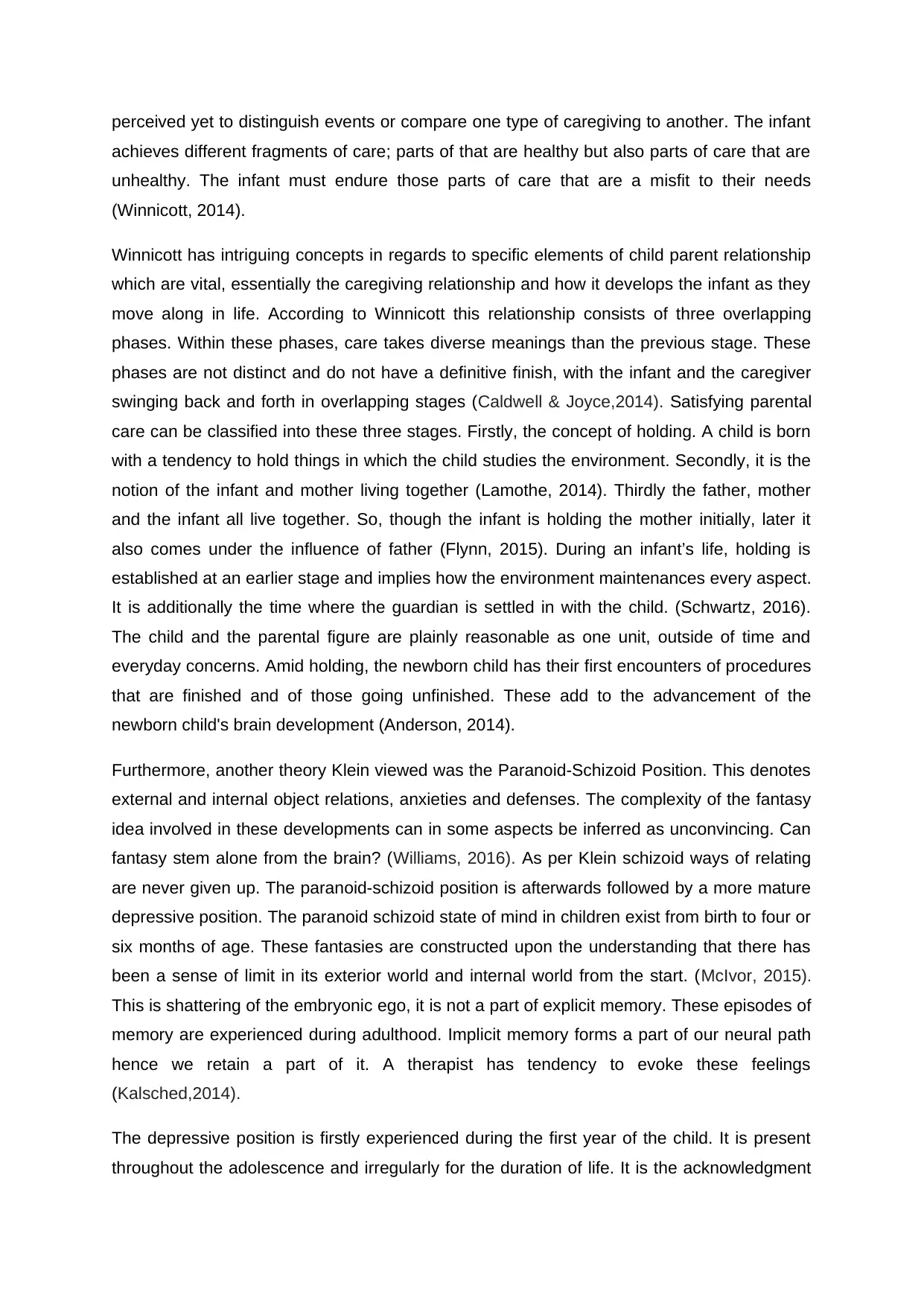
perceived yet to distinguish events or compare one type of caregiving to another. The infant
achieves different fragments of care; parts of that are healthy but also parts of care that are
unhealthy. The infant must endure those parts of care that are a misfit to their needs
(Winnicott, 2014).
Winnicott has intriguing concepts in regards to specific elements of child parent relationship
which are vital, essentially the caregiving relationship and how it develops the infant as they
move along in life. According to Winnicott this relationship consists of three overlapping
phases. Within these phases, care takes diverse meanings than the previous stage. These
phases are not distinct and do not have a definitive finish, with the infant and the caregiver
swinging back and forth in overlapping stages (Caldwell & Joyce,2014). Satisfying parental
care can be classified into these three stages. Firstly, the concept of holding. A child is born
with a tendency to hold things in which the child studies the environment. Secondly, it is the
notion of the infant and mother living together (Lamothe, 2014). Thirdly the father, mother
and the infant all live together. So, though the infant is holding the mother initially, later it
also comes under the influence of father (Flynn, 2015). During an infant’s life, holding is
established at an earlier stage and implies how the environment maintenances every aspect.
It is additionally the time where the guardian is settled in with the child. (Schwartz, 2016).
The child and the parental figure are plainly reasonable as one unit, outside of time and
everyday concerns. Amid holding, the newborn child has their first encounters of procedures
that are finished and of those going unfinished. These add to the advancement of the
newborn child's brain development (Anderson, 2014).
Furthermore, another theory Klein viewed was the Paranoid-Schizoid Position. This denotes
external and internal object relations, anxieties and defenses. The complexity of the fantasy
idea involved in these developments can in some aspects be inferred as unconvincing. Can
fantasy stem alone from the brain? (Williams, 2016). As per Klein schizoid ways of relating
are never given up. The paranoid-schizoid position is afterwards followed by a more mature
depressive position. The paranoid schizoid state of mind in children exist from birth to four or
six months of age. These fantasies are constructed upon the understanding that there has
been a sense of limit in its exterior world and internal world from the start. (McIvor, 2015).
This is shattering of the embryonic ego, it is not a part of explicit memory. These episodes of
memory are experienced during adulthood. Implicit memory forms a part of our neural path
hence we retain a part of it. A therapist has tendency to evoke these feelings
(Kalsched,2014).
The depressive position is firstly experienced during the first year of the child. It is present
throughout the adolescence and irregularly for the duration of life. It is the acknowledgment
achieves different fragments of care; parts of that are healthy but also parts of care that are
unhealthy. The infant must endure those parts of care that are a misfit to their needs
(Winnicott, 2014).
Winnicott has intriguing concepts in regards to specific elements of child parent relationship
which are vital, essentially the caregiving relationship and how it develops the infant as they
move along in life. According to Winnicott this relationship consists of three overlapping
phases. Within these phases, care takes diverse meanings than the previous stage. These
phases are not distinct and do not have a definitive finish, with the infant and the caregiver
swinging back and forth in overlapping stages (Caldwell & Joyce,2014). Satisfying parental
care can be classified into these three stages. Firstly, the concept of holding. A child is born
with a tendency to hold things in which the child studies the environment. Secondly, it is the
notion of the infant and mother living together (Lamothe, 2014). Thirdly the father, mother
and the infant all live together. So, though the infant is holding the mother initially, later it
also comes under the influence of father (Flynn, 2015). During an infant’s life, holding is
established at an earlier stage and implies how the environment maintenances every aspect.
It is additionally the time where the guardian is settled in with the child. (Schwartz, 2016).
The child and the parental figure are plainly reasonable as one unit, outside of time and
everyday concerns. Amid holding, the newborn child has their first encounters of procedures
that are finished and of those going unfinished. These add to the advancement of the
newborn child's brain development (Anderson, 2014).
Furthermore, another theory Klein viewed was the Paranoid-Schizoid Position. This denotes
external and internal object relations, anxieties and defenses. The complexity of the fantasy
idea involved in these developments can in some aspects be inferred as unconvincing. Can
fantasy stem alone from the brain? (Williams, 2016). As per Klein schizoid ways of relating
are never given up. The paranoid-schizoid position is afterwards followed by a more mature
depressive position. The paranoid schizoid state of mind in children exist from birth to four or
six months of age. These fantasies are constructed upon the understanding that there has
been a sense of limit in its exterior world and internal world from the start. (McIvor, 2015).
This is shattering of the embryonic ego, it is not a part of explicit memory. These episodes of
memory are experienced during adulthood. Implicit memory forms a part of our neural path
hence we retain a part of it. A therapist has tendency to evoke these feelings
(Kalsched,2014).
The depressive position is firstly experienced during the first year of the child. It is present
throughout the adolescence and irregularly for the duration of life. It is the acknowledgment
⊘ This is a preview!⊘
Do you want full access?
Subscribe today to unlock all pages.

Trusted by 1+ million students worldwide
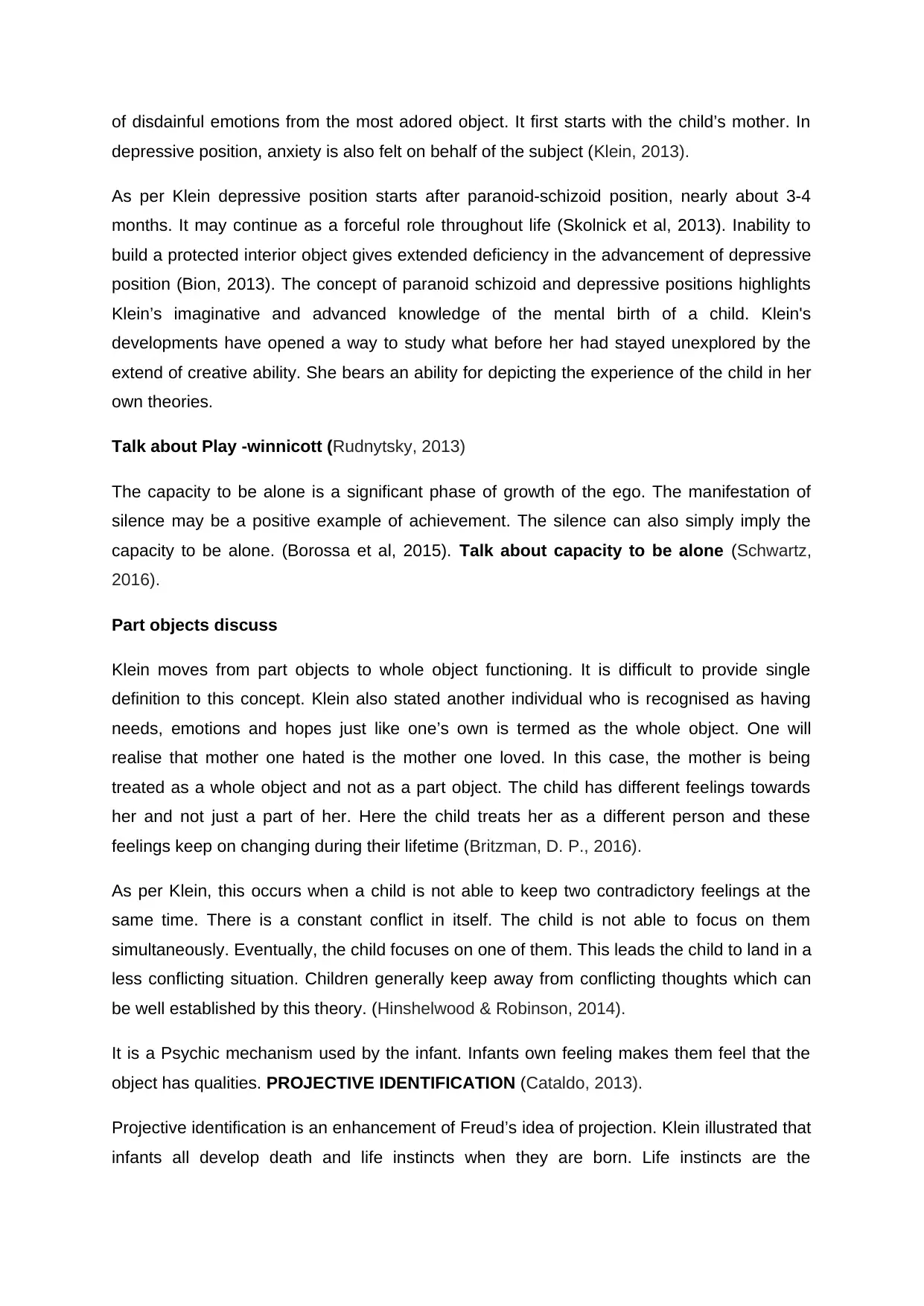
of disdainful emotions from the most adored object. It first starts with the child’s mother. In
depressive position, anxiety is also felt on behalf of the subject (Klein, 2013).
As per Klein depressive position starts after paranoid-schizoid position, nearly about 3-4
months. It may continue as a forceful role throughout life (Skolnick et al, 2013). Inability to
build a protected interior object gives extended deficiency in the advancement of depressive
position (Bion, 2013). The concept of paranoid schizoid and depressive positions highlights
Klein’s imaginative and advanced knowledge of the mental birth of a child. Klein's
developments have opened a way to study what before her had stayed unexplored by the
extend of creative ability. She bears an ability for depicting the experience of the child in her
own theories.
Talk about Play -winnicott (Rudnytsky, 2013)
The capacity to be alone is a significant phase of growth of the ego. The manifestation of
silence may be a positive example of achievement. The silence can also simply imply the
capacity to be alone. (Borossa et al, 2015). Talk about capacity to be alone (Schwartz,
2016).
Part objects discuss
Klein moves from part objects to whole object functioning. It is difficult to provide single
definition to this concept. Klein also stated another individual who is recognised as having
needs, emotions and hopes just like one’s own is termed as the whole object. One will
realise that mother one hated is the mother one loved. In this case, the mother is being
treated as a whole object and not as a part object. The child has different feelings towards
her and not just a part of her. Here the child treats her as a different person and these
feelings keep on changing during their lifetime (Britzman, D. P., 2016).
As per Klein, this occurs when a child is not able to keep two contradictory feelings at the
same time. There is a constant conflict in itself. The child is not able to focus on them
simultaneously. Eventually, the child focuses on one of them. This leads the child to land in a
less conflicting situation. Children generally keep away from conflicting thoughts which can
be well established by this theory. (Hinshelwood & Robinson, 2014).
It is a Psychic mechanism used by the infant. Infants own feeling makes them feel that the
object has qualities. PROJECTIVE IDENTIFICATION (Cataldo, 2013).
Projective identification is an enhancement of Freud’s idea of projection. Klein illustrated that
infants all develop death and life instincts when they are born. Life instincts are the
depressive position, anxiety is also felt on behalf of the subject (Klein, 2013).
As per Klein depressive position starts after paranoid-schizoid position, nearly about 3-4
months. It may continue as a forceful role throughout life (Skolnick et al, 2013). Inability to
build a protected interior object gives extended deficiency in the advancement of depressive
position (Bion, 2013). The concept of paranoid schizoid and depressive positions highlights
Klein’s imaginative and advanced knowledge of the mental birth of a child. Klein's
developments have opened a way to study what before her had stayed unexplored by the
extend of creative ability. She bears an ability for depicting the experience of the child in her
own theories.
Talk about Play -winnicott (Rudnytsky, 2013)
The capacity to be alone is a significant phase of growth of the ego. The manifestation of
silence may be a positive example of achievement. The silence can also simply imply the
capacity to be alone. (Borossa et al, 2015). Talk about capacity to be alone (Schwartz,
2016).
Part objects discuss
Klein moves from part objects to whole object functioning. It is difficult to provide single
definition to this concept. Klein also stated another individual who is recognised as having
needs, emotions and hopes just like one’s own is termed as the whole object. One will
realise that mother one hated is the mother one loved. In this case, the mother is being
treated as a whole object and not as a part object. The child has different feelings towards
her and not just a part of her. Here the child treats her as a different person and these
feelings keep on changing during their lifetime (Britzman, D. P., 2016).
As per Klein, this occurs when a child is not able to keep two contradictory feelings at the
same time. There is a constant conflict in itself. The child is not able to focus on them
simultaneously. Eventually, the child focuses on one of them. This leads the child to land in a
less conflicting situation. Children generally keep away from conflicting thoughts which can
be well established by this theory. (Hinshelwood & Robinson, 2014).
It is a Psychic mechanism used by the infant. Infants own feeling makes them feel that the
object has qualities. PROJECTIVE IDENTIFICATION (Cataldo, 2013).
Projective identification is an enhancement of Freud’s idea of projection. Klein illustrated that
infants all develop death and life instincts when they are born. Life instincts are the
Paraphrase This Document
Need a fresh take? Get an instant paraphrase of this document with our AI Paraphraser
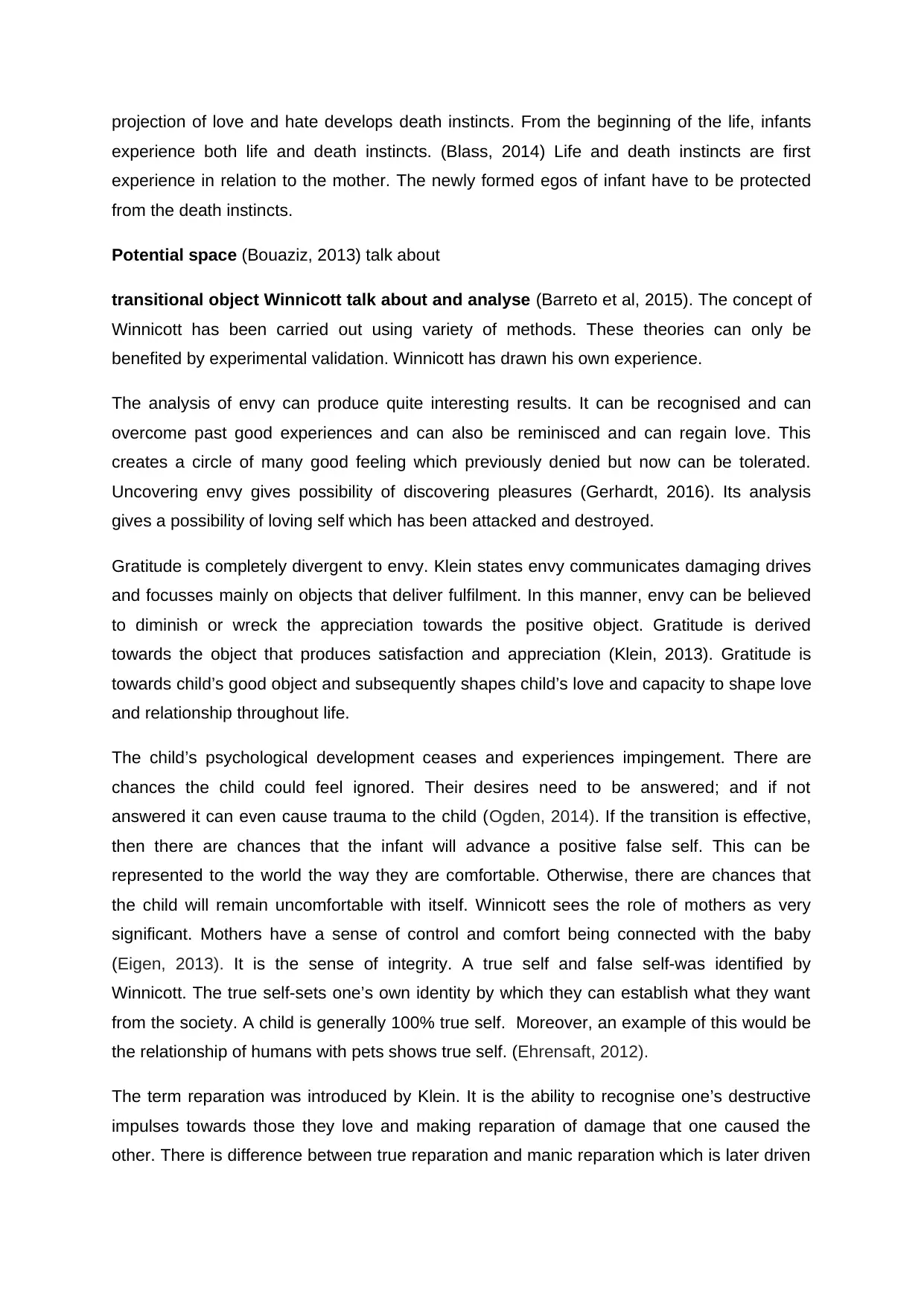
projection of love and hate develops death instincts. From the beginning of the life, infants
experience both life and death instincts. (Blass, 2014) Life and death instincts are first
experience in relation to the mother. The newly formed egos of infant have to be protected
from the death instincts.
Potential space (Bouaziz, 2013) talk about
transitional object Winnicott talk about and analyse (Barreto et al, 2015). The concept of
Winnicott has been carried out using variety of methods. These theories can only be
benefited by experimental validation. Winnicott has drawn his own experience.
The analysis of envy can produce quite interesting results. It can be recognised and can
overcome past good experiences and can also be reminisced and can regain love. This
creates a circle of many good feeling which previously denied but now can be tolerated.
Uncovering envy gives possibility of discovering pleasures (Gerhardt, 2016). Its analysis
gives a possibility of loving self which has been attacked and destroyed.
Gratitude is completely divergent to envy. Klein states envy communicates damaging drives
and focusses mainly on objects that deliver fulfilment. In this manner, envy can be believed
to diminish or wreck the appreciation towards the positive object. Gratitude is derived
towards the object that produces satisfaction and appreciation (Klein, 2013). Gratitude is
towards child’s good object and subsequently shapes child’s love and capacity to shape love
and relationship throughout life.
The child’s psychological development ceases and experiences impingement. There are
chances the child could feel ignored. Their desires need to be answered; and if not
answered it can even cause trauma to the child (Ogden, 2014). If the transition is effective,
then there are chances that the infant will advance a positive false self. This can be
represented to the world the way they are comfortable. Otherwise, there are chances that
the child will remain uncomfortable with itself. Winnicott sees the role of mothers as very
significant. Mothers have a sense of control and comfort being connected with the baby
(Eigen, 2013). It is the sense of integrity. A true self and false self-was identified by
Winnicott. The true self-sets one’s own identity by which they can establish what they want
from the society. A child is generally 100% true self. Moreover, an example of this would be
the relationship of humans with pets shows true self. (Ehrensaft, 2012).
The term reparation was introduced by Klein. It is the ability to recognise one’s destructive
impulses towards those they love and making reparation of damage that one caused the
other. There is difference between true reparation and manic reparation which is later driven
experience both life and death instincts. (Blass, 2014) Life and death instincts are first
experience in relation to the mother. The newly formed egos of infant have to be protected
from the death instincts.
Potential space (Bouaziz, 2013) talk about
transitional object Winnicott talk about and analyse (Barreto et al, 2015). The concept of
Winnicott has been carried out using variety of methods. These theories can only be
benefited by experimental validation. Winnicott has drawn his own experience.
The analysis of envy can produce quite interesting results. It can be recognised and can
overcome past good experiences and can also be reminisced and can regain love. This
creates a circle of many good feeling which previously denied but now can be tolerated.
Uncovering envy gives possibility of discovering pleasures (Gerhardt, 2016). Its analysis
gives a possibility of loving self which has been attacked and destroyed.
Gratitude is completely divergent to envy. Klein states envy communicates damaging drives
and focusses mainly on objects that deliver fulfilment. In this manner, envy can be believed
to diminish or wreck the appreciation towards the positive object. Gratitude is derived
towards the object that produces satisfaction and appreciation (Klein, 2013). Gratitude is
towards child’s good object and subsequently shapes child’s love and capacity to shape love
and relationship throughout life.
The child’s psychological development ceases and experiences impingement. There are
chances the child could feel ignored. Their desires need to be answered; and if not
answered it can even cause trauma to the child (Ogden, 2014). If the transition is effective,
then there are chances that the infant will advance a positive false self. This can be
represented to the world the way they are comfortable. Otherwise, there are chances that
the child will remain uncomfortable with itself. Winnicott sees the role of mothers as very
significant. Mothers have a sense of control and comfort being connected with the baby
(Eigen, 2013). It is the sense of integrity. A true self and false self-was identified by
Winnicott. The true self-sets one’s own identity by which they can establish what they want
from the society. A child is generally 100% true self. Moreover, an example of this would be
the relationship of humans with pets shows true self. (Ehrensaft, 2012).
The term reparation was introduced by Klein. It is the ability to recognise one’s destructive
impulses towards those they love and making reparation of damage that one caused the
other. There is difference between true reparation and manic reparation which is later driven
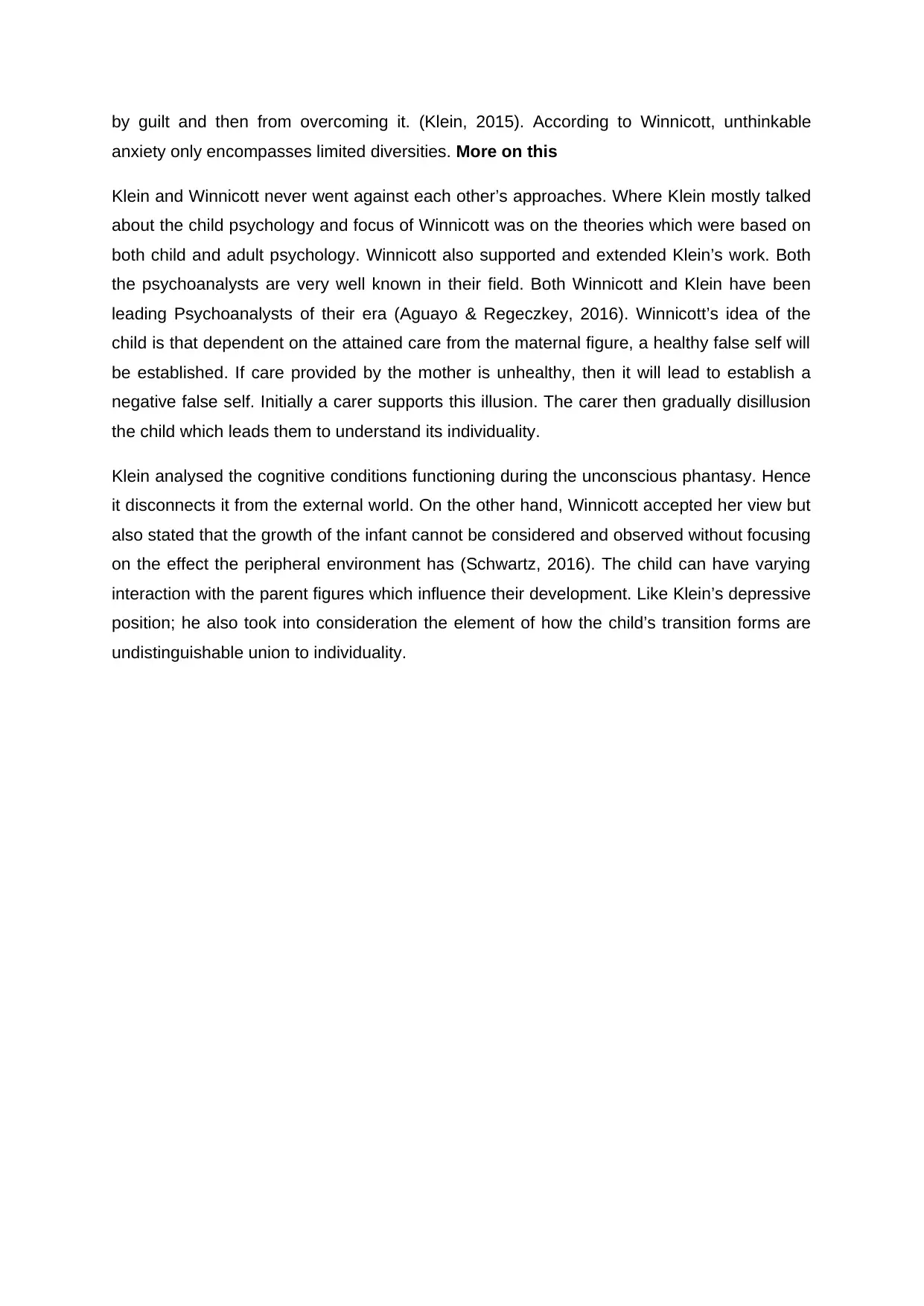
by guilt and then from overcoming it. (Klein, 2015). According to Winnicott, unthinkable
anxiety only encompasses limited diversities. More on this
Klein and Winnicott never went against each other’s approaches. Where Klein mostly talked
about the child psychology and focus of Winnicott was on the theories which were based on
both child and adult psychology. Winnicott also supported and extended Klein’s work. Both
the psychoanalysts are very well known in their field. Both Winnicott and Klein have been
leading Psychoanalysts of their era (Aguayo & Regeczkey, 2016). Winnicott’s idea of the
child is that dependent on the attained care from the maternal figure, a healthy false self will
be established. If care provided by the mother is unhealthy, then it will lead to establish a
negative false self. Initially a carer supports this illusion. The carer then gradually disillusion
the child which leads them to understand its individuality.
Klein analysed the cognitive conditions functioning during the unconscious phantasy. Hence
it disconnects it from the external world. On the other hand, Winnicott accepted her view but
also stated that the growth of the infant cannot be considered and observed without focusing
on the effect the peripheral environment has (Schwartz, 2016). The child can have varying
interaction with the parent figures which influence their development. Like Klein’s depressive
position; he also took into consideration the element of how the child’s transition forms are
undistinguishable union to individuality.
anxiety only encompasses limited diversities. More on this
Klein and Winnicott never went against each other’s approaches. Where Klein mostly talked
about the child psychology and focus of Winnicott was on the theories which were based on
both child and adult psychology. Winnicott also supported and extended Klein’s work. Both
the psychoanalysts are very well known in their field. Both Winnicott and Klein have been
leading Psychoanalysts of their era (Aguayo & Regeczkey, 2016). Winnicott’s idea of the
child is that dependent on the attained care from the maternal figure, a healthy false self will
be established. If care provided by the mother is unhealthy, then it will lead to establish a
negative false self. Initially a carer supports this illusion. The carer then gradually disillusion
the child which leads them to understand its individuality.
Klein analysed the cognitive conditions functioning during the unconscious phantasy. Hence
it disconnects it from the external world. On the other hand, Winnicott accepted her view but
also stated that the growth of the infant cannot be considered and observed without focusing
on the effect the peripheral environment has (Schwartz, 2016). The child can have varying
interaction with the parent figures which influence their development. Like Klein’s depressive
position; he also took into consideration the element of how the child’s transition forms are
undistinguishable union to individuality.
⊘ This is a preview!⊘
Do you want full access?
Subscribe today to unlock all pages.

Trusted by 1+ million students worldwide
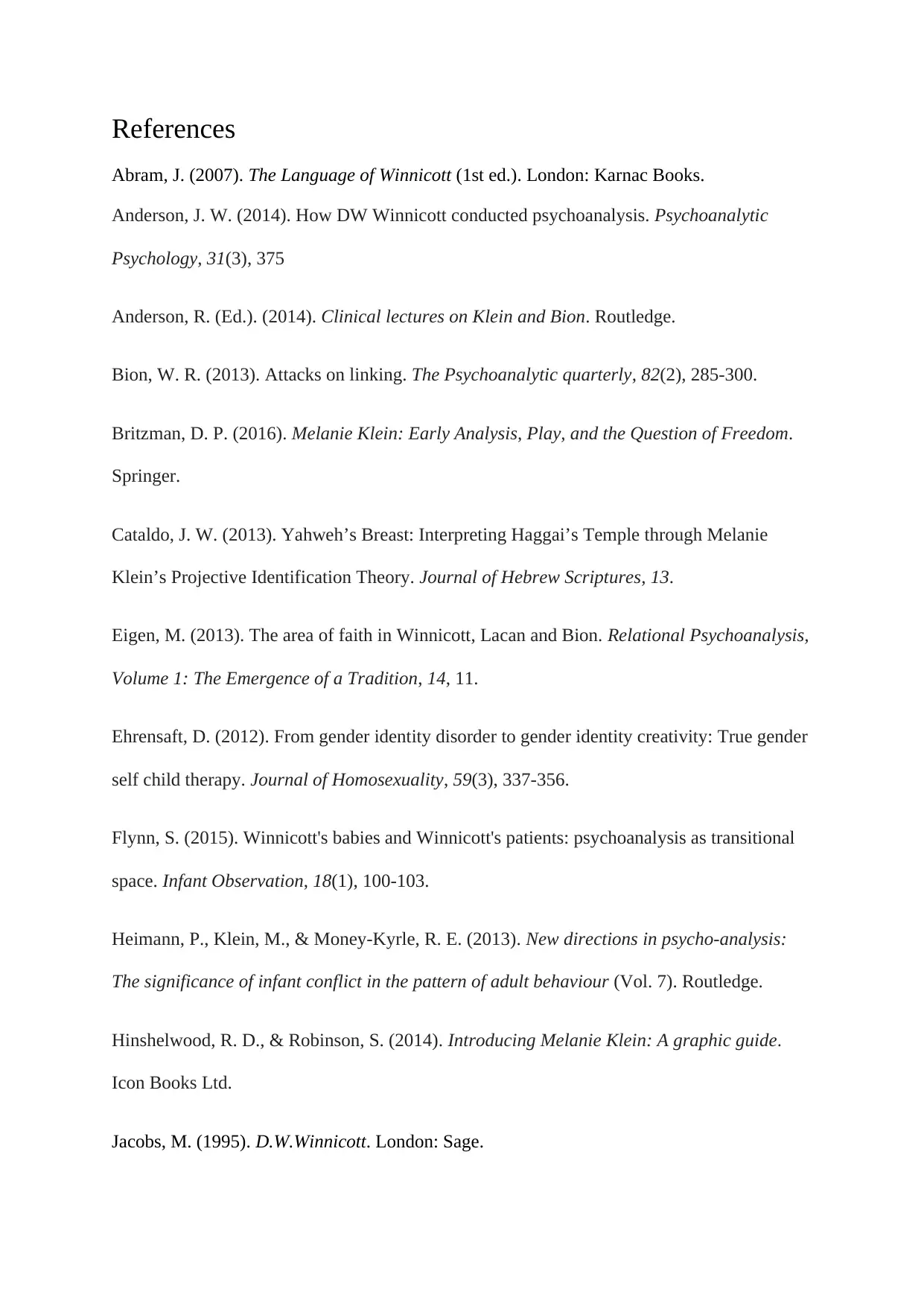
References
Abram, J. (2007). The Language of Winnicott (1st ed.). London: Karnac Books.
Anderson, J. W. (2014). How DW Winnicott conducted psychoanalysis. Psychoanalytic
Psychology, 31(3), 375
Anderson, R. (Ed.). (2014). Clinical lectures on Klein and Bion. Routledge.
Bion, W. R. (2013). Attacks on linking. The Psychoanalytic quarterly, 82(2), 285-300.
Britzman, D. P. (2016). Melanie Klein: Early Analysis, Play, and the Question of Freedom.
Springer.
Cataldo, J. W. (2013). Yahweh’s Breast: Interpreting Haggai’s Temple through Melanie
Klein’s Projective Identification Theory. Journal of Hebrew Scriptures, 13.
Eigen, M. (2013). The area of faith in Winnicott, Lacan and Bion. Relational Psychoanalysis,
Volume 1: The Emergence of a Tradition, 14, 11.
Ehrensaft, D. (2012). From gender identity disorder to gender identity creativity: True gender
self child therapy. Journal of Homosexuality, 59(3), 337-356.
Flynn, S. (2015). Winnicott's babies and Winnicott's patients: psychoanalysis as transitional
space. Infant Observation, 18(1), 100-103.
Heimann, P., Klein, M., & Money-Kyrle, R. E. (2013). New directions in psycho-analysis:
The significance of infant conflict in the pattern of adult behaviour (Vol. 7). Routledge.
Hinshelwood, R. D., & Robinson, S. (2014). Introducing Melanie Klein: A graphic guide.
Icon Books Ltd.
Jacobs, M. (1995). D.W.Winnicott. London: Sage.
Abram, J. (2007). The Language of Winnicott (1st ed.). London: Karnac Books.
Anderson, J. W. (2014). How DW Winnicott conducted psychoanalysis. Psychoanalytic
Psychology, 31(3), 375
Anderson, R. (Ed.). (2014). Clinical lectures on Klein and Bion. Routledge.
Bion, W. R. (2013). Attacks on linking. The Psychoanalytic quarterly, 82(2), 285-300.
Britzman, D. P. (2016). Melanie Klein: Early Analysis, Play, and the Question of Freedom.
Springer.
Cataldo, J. W. (2013). Yahweh’s Breast: Interpreting Haggai’s Temple through Melanie
Klein’s Projective Identification Theory. Journal of Hebrew Scriptures, 13.
Eigen, M. (2013). The area of faith in Winnicott, Lacan and Bion. Relational Psychoanalysis,
Volume 1: The Emergence of a Tradition, 14, 11.
Ehrensaft, D. (2012). From gender identity disorder to gender identity creativity: True gender
self child therapy. Journal of Homosexuality, 59(3), 337-356.
Flynn, S. (2015). Winnicott's babies and Winnicott's patients: psychoanalysis as transitional
space. Infant Observation, 18(1), 100-103.
Heimann, P., Klein, M., & Money-Kyrle, R. E. (2013). New directions in psycho-analysis:
The significance of infant conflict in the pattern of adult behaviour (Vol. 7). Routledge.
Hinshelwood, R. D., & Robinson, S. (2014). Introducing Melanie Klein: A graphic guide.
Icon Books Ltd.
Jacobs, M. (1995). D.W.Winnicott. London: Sage.
Paraphrase This Document
Need a fresh take? Get an instant paraphrase of this document with our AI Paraphraser
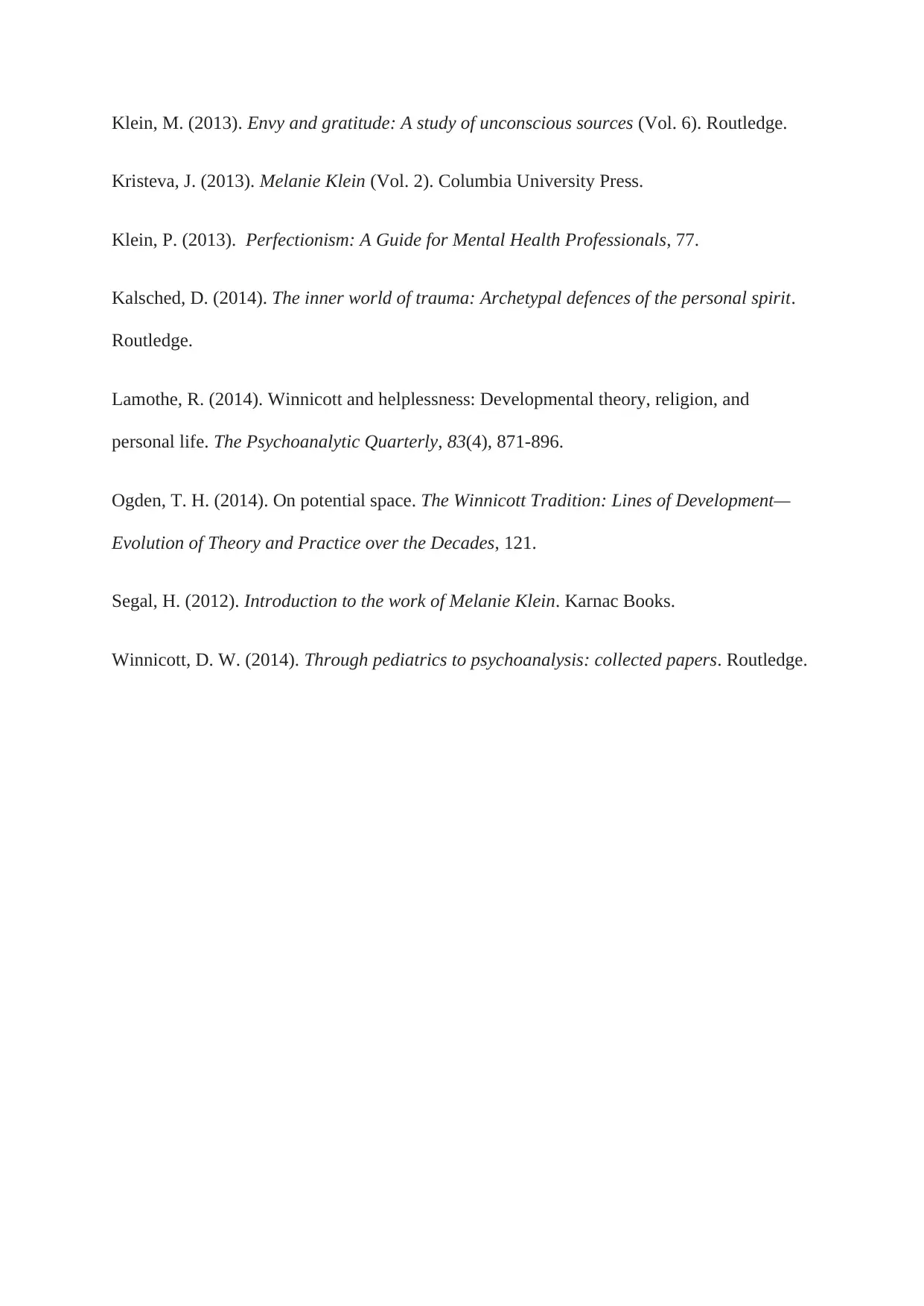
Klein, M. (2013). Envy and gratitude: A study of unconscious sources (Vol. 6). Routledge.
Kristeva, J. (2013). Melanie Klein (Vol. 2). Columbia University Press.
Klein, P. (2013). Perfectionism: A Guide for Mental Health Professionals, 77.
Kalsched, D. (2014). The inner world of trauma: Archetypal defences of the personal spirit.
Routledge.
Lamothe, R. (2014). Winnicott and helplessness: Developmental theory, religion, and
personal life. The Psychoanalytic Quarterly, 83(4), 871-896.
Ogden, T. H. (2014). On potential space. The Winnicott Tradition: Lines of Development—
Evolution of Theory and Practice over the Decades, 121.
Segal, H. (2012). Introduction to the work of Melanie Klein. Karnac Books.
Winnicott, D. W. (2014). Through pediatrics to psychoanalysis: collected papers. Routledge.
Kristeva, J. (2013). Melanie Klein (Vol. 2). Columbia University Press.
Klein, P. (2013). Perfectionism: A Guide for Mental Health Professionals, 77.
Kalsched, D. (2014). The inner world of trauma: Archetypal defences of the personal spirit.
Routledge.
Lamothe, R. (2014). Winnicott and helplessness: Developmental theory, religion, and
personal life. The Psychoanalytic Quarterly, 83(4), 871-896.
Ogden, T. H. (2014). On potential space. The Winnicott Tradition: Lines of Development—
Evolution of Theory and Practice over the Decades, 121.
Segal, H. (2012). Introduction to the work of Melanie Klein. Karnac Books.
Winnicott, D. W. (2014). Through pediatrics to psychoanalysis: collected papers. Routledge.
1 out of 8
Related Documents
Your All-in-One AI-Powered Toolkit for Academic Success.
+13062052269
info@desklib.com
Available 24*7 on WhatsApp / Email
![[object Object]](/_next/static/media/star-bottom.7253800d.svg)
Unlock your academic potential
Copyright © 2020–2026 A2Z Services. All Rights Reserved. Developed and managed by ZUCOL.





